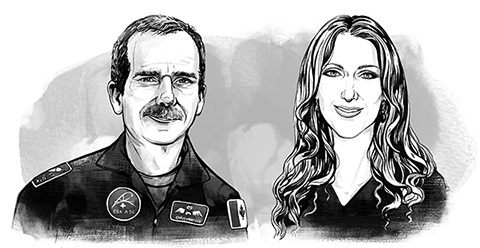The English and French have co-existed in Canada for more than 150 years, and some of us have become adept at telling each other apart based on how we look, research by a U of T grad student has found.
Thora Bjornsdottir, a PhD candidate in psychology, and Prof. Greg West, at Université de Montréal, asked groups of English- and French-Canadians to look at pictures of faces and identify them as English- or French-Canadian. All the faces were Caucasian.
The English group made the correct identification 62 per cent of the time – significantly above chance. The French group, on the other hand, scored 51 per cent – not much better than chance. The English also remembered members of their own group better and thought they looked more Canadian. Similarly, the French identified the people they thought were members of their group as more Canadian.
Both groups stereotyped French-Canadian faces as “warmer” and English-Canadian faces as “more dominant.” But the faces of French- and English-Canadians do not actually differ in this way. Instead, the French-Canadian faces appeared more “distinctive” than the English-Canadian faces (participants defined the term subjectively) – a difference that the English-Canadian participants used to make accurate categorizations.
Bjornsdottir works in the lab of Nicholas Rule, a psychology professor who studies people’s first visual impressions of “perceptually ambiguous groups,” such as members of the LGBTQ community, or liberals and conservatives. She says this kind of research helps explain how first impressions colour our interactions with people. “The face is what we look at first, and our reaction to a face affects how we interact with people later. It can lead to self-fulfilling prophecies.”
She adds that these findings can also help different groups understand each other better and alleviate conflicts between them.
Thora Bjornsdottir’s research is supported by an Ontario Graduate Scholarship and by the Social Sciences and Humanities Research Council.
Recent Posts
People Worry That AI Will Replace Workers. But It Could Make Some More Productive
These scholars say artificial intelligence could help reduce income inequality
A Sentinel for Global Health
AI is promising a better – and faster – way to monitor the world for emerging medical threats
The Age of Deception
AI is generating a disinformation arms race. The window to stop it may be closing





